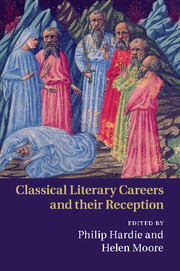Book contents
- Frontmatter
- Contents
- List of contributors
- Preface
- Note on the text
- Introduction: Literary careers – Classical models and their receptions
- 1 Some Virgilian unities
- 2 There and back again: Horace's poetic career
- 3 The Ovidian career model: Ovid, Gallus, Apuleius, Boccaccio
- 4 An elegist's career: from Cynthia to Cornelia
- 5 Persona and satiric career in Juvenal
- 6 The indistinct literary careers of Cicero and Pliny the Younger
- 7 Re-inventing Virgil's Wheel: the poet and his work from Dante to Petrarch
- 8 Did Shakespeare have a literary career?
- 9 New spins on old rotas: Virgil, Ovid, Milton
- 10 Bookburning and the poetic deathbed: the legacy of Virgil
- 11 Literary afterlives: metempsychosis from Ennius to Jorge Luis Borges
- 12 ‘Mirrored doubles’: Andrew Marvell, the remaking of poetry and the poet's career
- 13 Dryden and the complete career
- 14 Goethe's elegiac sabbatical
- 15 Wordsworth's career prospects: ‘peculiar language’ and public epigraphs
- Epilogue: Inventing a life – a personal view of literary careers
- List of works cited
- Index
13 - Dryden and the complete career
Published online by Cambridge University Press: 10 November 2010
- Frontmatter
- Contents
- List of contributors
- Preface
- Note on the text
- Introduction: Literary careers – Classical models and their receptions
- 1 Some Virgilian unities
- 2 There and back again: Horace's poetic career
- 3 The Ovidian career model: Ovid, Gallus, Apuleius, Boccaccio
- 4 An elegist's career: from Cynthia to Cornelia
- 5 Persona and satiric career in Juvenal
- 6 The indistinct literary careers of Cicero and Pliny the Younger
- 7 Re-inventing Virgil's Wheel: the poet and his work from Dante to Petrarch
- 8 Did Shakespeare have a literary career?
- 9 New spins on old rotas: Virgil, Ovid, Milton
- 10 Bookburning and the poetic deathbed: the legacy of Virgil
- 11 Literary afterlives: metempsychosis from Ennius to Jorge Luis Borges
- 12 ‘Mirrored doubles’: Andrew Marvell, the remaking of poetry and the poet's career
- 13 Dryden and the complete career
- 14 Goethe's elegiac sabbatical
- 15 Wordsworth's career prospects: ‘peculiar language’ and public epigraphs
- Epilogue: Inventing a life – a personal view of literary careers
- List of works cited
- Index
Summary
I may venture to say in general Terms, that no Man hath written in our language so much, and in so various Manners, so well.
Congreve's comment reveals itself as praise only at the last – at least he did it ‘so well’. The volume of Dryden's achievement is undoubted. It is not so clear how to evaluate his literary career, or indeed to assert that his collected works constitute a literary career at all. Steven Zwicker opens The Cambridge Companion to Dryden with this very point: ‘Who first thought of The Works of John Dryden? Not, I think, the poet himself.’ If the goal is ‘holistic commentary’, then it may be unattainable. When Zwicker faces the challenge of assessing Dryden's poetic career, he emphasizes the role of irony, and finds the author ‘disappearing into his art’. He does not fit the post-Virgilian mould that has dominated career criticism, though he certainly had plans and ambitions. It may be that Dryden actually had multiple careers – epic poet, translator, dramatist, critic, satirist – that overlap at times but cannot feasibly be made to cohere. However, he may also be a significant representative of another sort of literary career: the ‘complete’ career, where many different sorts of writing are attempted in an implicit or explicit project to command as much canonical territory as possible.
- Type
- Chapter
- Information
- Classical Literary Careers and their Reception , pp. 241 - 255Publisher: Cambridge University PressPrint publication year: 2010
- 1
- Cited by

